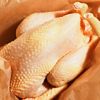
Shop bought chickens test positive for Campolybacter
The Food Standards Agency has today published the first set of quarterly results from a new survey of Campylobacter, a food-poisoning bacteria, on fresh shop-bought chickens.
The results show 59% of birds tested positive for the presence of Campylobacter, which is considered to be responsible for more than 280,000 cases of food poisoning each year. In 4% of samples Campylobacter was also identified on the outside of the packaging.
Campolybacter is killed by thorough cooking, however, it is the most common form of food poisoning in the UK, affecting an estimated 280,000 people a year. Previous estimates have indicated that the bacteria causes more than 100 deaths a year, and costs the UK economy about £900 million. The majority of these cases come from contaminated poultry.
The 12-month survey, running from February 2014 to February 2015, is looking at the prevalence and levels of Campylobacter contamination on fresh whole chilled chickens and their packaging. The survey will test 4,000 samples of whole chickens bought from UK retail outlets and smaller independent stores and butchers. Today’s results are for the first quarter and represent 853 samples.
Catherine Brown, FSA Chief Executive, said: “The chicken supply chain is looking at how interventions such as improved biosecurity on farms, rapid surface chilling, and anti-microbial washes can help reduce Campylobacter. So when they take action and invest in interventions designed to make a difference, these survey figures will enable us to see if they really do make an impact.
"The low levels of contamination found on packaging, shown in the results released today, potentially indicate the effectiveness of the leak-proof packaging for poultry introduced by most retailers, which helps to reduce risks of cross contamination in consumers’ kitchens. There is still a lot more to be done by all elements of the supply chain to ensure that consumers can be confident in the food they buy.”
Chicken is quite safe as long as consumers follow good kitchen practice. Here is the FSA's guide:
- Cover and chill raw chicken - Cover raw chicken and store at the bottom of the fridge so juices cannot drip on to other foods and contaminate them with food poisoning bacteria such as Campylobacter.
- Don’t wash raw chicken - Cooking will kill any bacteria present, including Campylobacter, while washing chicken can spread germs by splashing
- Wash used utensils - Thoroughly wash and clean all utensils, chopping boards and surfaces used to prepare raw chicken. Wash hands thoroughly with soap and warm water, after handling raw chicken. This helps stop the spread of Campylobacter by avoiding cross contamination.
- Cook chicken thoroughly - Make sure chicken is steaming hot all the way through before serving. Cut in to the thickest part of the meat and check that it is steaming hot with no pink meat and that the juices run clear.















